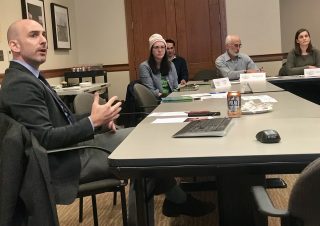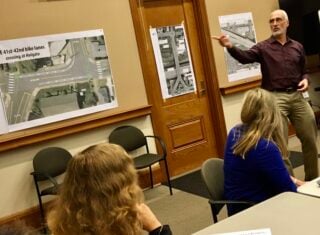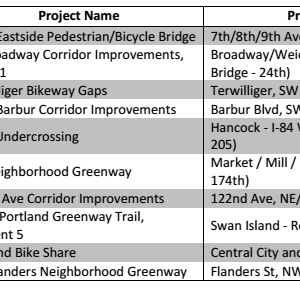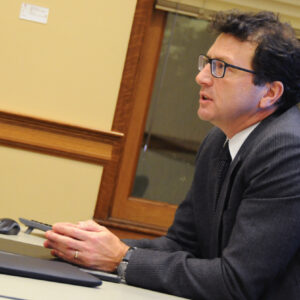
(Photos © J. Maus/BikePortland)
Have you been wanting to get more engaged with bicycling policy and advocacy in Portland? Or perhaps just learn more about how the Portland Bureau of Transportation works and plans for more cycling?
If so, listen up: the PBOT Bicycle Advisory Committee (BAC) is looking to fill 13 seats and applications are being accepted through Sunday, January 12th.
The BAC has space for 20 members and meets every second Tuesday in City Hall. The official purpose of the committee is to, “Advise City Council and all departments of the City on all matters relating to the use of the bicycle as a means of transportation and recreation.”
PBOT Bicycle Coordinator Roger Geller, who has over 30 years of experience in PBOT’s bicycle program, is the staff liaison to the committee. Everyone else is a volunteer. Along with the Freight Advisory Committee and the Pedestrian Advisory Committee, the BAC is one of the city’s three “modal committees”.
Advertisement

In the 15 or so years I’ve been on this beat, the BAC is the committee I’ve attended more than any other. Why? Because in my opinion it’s consistently where the smartest, most informed, and most substantive discussions take place regarding the plans, policies and projects that matter.
The BAC is where every agency and city bureau comes to present new policies and projects. They also receive presentations and hold meet-and-greets with key community leaders and influential politicians. At one recent meeting members heard a presentation about how the City wanted to spend the next round of local gas tax revenue. They were shown a list of potential projects and dollar amounts and were asked for feedback. Then at the next month’s meeting they were shown a revised proposal based (in part) on their input.
Advertisement
BikePortland columnist and BikeLoud PDX Co-Chair Catie Gould has served on the BAC for almost two years. “It’s a little frustrating, pretty fun, and I appreciate the regular engagement with staff and the other really awesome people serving on the committee,” she recently shared.
Biking in Portland is headed in the wrong direction and we need more savvy people like you to step up and help Catie and the rest of the BAC members to have as much impact as possible!
To download and complete an application to join, check out the official announcement from the Office of Civic Life.
For more information on the committee, check out the BAC website.
— Jonathan Maus: (503) 706-8804, @jonathan_maus on Twitter and jonathan@bikeportland.org
— Get our headlines delivered to your inbox.
— Support this independent community media outlet with a one-time contribution or monthly subscription.







Thanks for reading.
BikePortland has served this community with independent community journalism since 2005. We rely on subscriptions from readers like you to survive. Your financial support is vital in keeping this valuable resource alive and well.
Please subscribe today to strengthen and expand our work.
I served on this committee in 2015, as well as the PBOT Bureau Advisory Committee 2009-15.
Like any committee, it’s only as good as the sum of its parts, which not only includes its members and alternates, but its city staffing, regular visitors and members of the press who regularly attend.
To make it easier for the committee to recruit new members from throughout the city and with greater income diversity, might I suggest they meet on a regular rotation at locations throughout the city, rather than just downtown at city hall?
Based on my experience in working with a similar committee here in North Carolina, I have the following additional suggestions:
– Recruit representatives from particular organizations rather than interested individuals.
– Have regular staff to attend each and every meeting who are traffic engineers rather than planners or administrators, people who frequently say “no” to progressive improvements – find out why they say no, and understand their thinking.
– Make sure there is representation from the bike share companies, business groups, and any other stakeholders who might be adversely affected by BAC recommendations.
– Expand the scope of the committee to include shared spaces for bike, transit, and walking, but also to actively advocate for transit and scooter improvements.
One reservation I have about throwing my name in the hat for this committee is what I like to call “the illusion of inclusion.”
Gov’t entities in Portland have a mandate to “include the public,” so they generally find a few pennies in the budget or a few hours of staff time to create a committee or a process or an event. Some of the more slick operations even pay full-time staff or contractors to manage these efforts.
But they all end up producing simulacra of actual involvement – that is, they are designed to convey an illusion of inclusion, not actual influence over a process. The influencers are the people who hold power within the organization, and they are not giving it up. So if you’re on one of these committees, you end up with little crumbs of involvement – maybe putting round colored stickers on a board, to “vote” for something you want. Your “votes” are then ignored when the decision-makers get together to make the actual decisions.
Sorry to sound cynical, but that has been my experience with public-involvement efforts in Portland. Cyclists could better spend their time, methinks, on letter-writing and lobbying campaigns and actual political campaigns, rather than wasting their time in committees that provide the illusion of inclusion.
I think you’re describing a probalem with pretty much every hierarchal decision-making system. The inputs are only as effective as the decision-makers are willing to heed them. I don’t have any insight on the BAC specifically, but my general observation from analagous systems is that their influence can vary widely, partially depending on the skills of those involved in being influential (and obviously, also depending on the receptiveness of the decision makers and the influence of others).
I’m curious how letter writing would be better time. Doesn’t that suffer from exactly the same problem? Letters are even easier to ignore.
Keep in mind who the decision makers are in a bureaucracy. It’s not necessarily elected officials. More often than not in a DOT it’s junior-level administrators and engineers who make most of the decisions – what gets implemented or not, how fast it is implemented or delayed, and what is allowed to be voted on by elected officials. It’s much the same with traffic enforcement: we can have all kinds of policies and laws on enforcement, but really it’s up to individual police officers to patrol their jurisdictions, pull over motorists, and write tickets; AND it’s up to prosecutors to carry out those charges through the courts. Both the police officers and the prosecutors are government-funded junior-level administrators who have a huge role to play in enforcement, but who are not elected.
Any BAC that wants to be successful needs to recognize that in order to recruit and retain good members, it needs to have an equally good track record on influencing decision-makers, be it electeds or engineering staff. Which is why I’m pushing that the BAC needs to have more representation or attendance by city and agency staff who are traffic engineers – even if they can’t influence the junior-level administrators and engineers directly within PBOT/TriMet/ODOT, committee members can at least learn to speak engineerese and to think a bit like an engineer. I have also observed over the years that if you can influence the thinking of one engineer, even if it’s the wrong one, those ideas are more likely to be passed on to other engineers by engineers, rather than by us laymen, and eventually the right engineer will receive the idea.
I hear ya, David, but the structural changes you recommend – to give the BAC some real “teeth” – would have to be enacted by the people running the BAC; it’s not something any of us could enact. Hence my ongoing skepticism about the real utility of the group.
A letter-writing campaign at least allows you to put your thoughts to people in charge. When they ignore your best ideas, at least you haven’t invested six or nine or twelve months of effort.
To be sure, most DOTs prefer committees, commissions, and boards, and their respective membership, that are “seen but not heard” and accordingly treat them like children. And as long as the BAC stays passive they will continue to be treated as such by the DOT staff and elected officials. Any committee, board, or commission is only as powerful as the members allow themselves collectively to be (or try to get away with).
Thank you for your thoughts David, any recommendations of other organizations worth volunteering my time for?
If you have weekday evenings available, your friendly local neighborhood association is desperate for your participation, particularly if you are terribly young (under the age of 60), any sort of “minority” however defined, and are a renter or new homeowner. Yeah, they tend to be older and more conservative organizations because those are the people with lots of free time, but in Portland neighborhood associations wield a disproportionate amount of power in local planning and land use decisions. If you live east of 82nd, consider joining the East Portland Action Plan EPAP, or one of its many committees – they not only do good work, they’ve had a real impact in East Portland since it was organized in 2009 – plus as a bonus, all their meetings are catered, have live language interpretation, and childcare on demand. Nearly as impressive and far older is SWNI in southwest Portland. And if you really are a glutton for punishment for all your sins, try to get yourself appointed to the PBOT Bureau Advisory Committee and help PBOT avoid f***ing up (again and again) by giving them useful advice about their $300 million annual budget. Kudos of course to all the different flavors of volunteer bike organizations in Portland, especially the highly secretive PDX Transformation, BikeLoud!, the Street Trust/BTA, Oregon Walks/WPC, the various bike coops, and many other volunteer groups – if you have the time and inclination, there’s a group of six that you’ll fit in just fine and gain camaraderie, new ideas, and a little more faith in your fellow humans. Don’t know where to start in finding a group for you? Ask Jonathan, he’ll know who you need to contact.
This is exactly my experience in serving on these “public involvement” committees.
I’ve decided not to volunteer my time any more because I do not want to be a rubber stamp for the powers that be. It only lends legitimacy to pre-determined decisions, and I’m interested in changing the status-quo, not giving it the appearance of legitimacy.
And I agree as well about your suggestions for other methods as superior ways to effect change.
I think they should have a representative from the governor’s office, like the freight (a couple rungs down the transportation priority hierarchy) committee does.
This seems like a great opportunity to advocate for more off road cycling oppurtunities. Not sure what the impact would be, but every little bit helps, right?